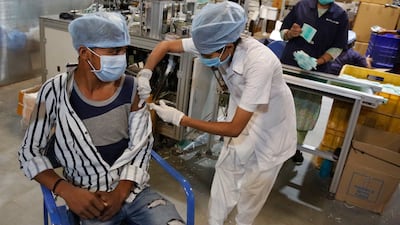India’s federal Health Ministry has asked regional governments to impose nightly curfews and set up war rooms to tackle the spread of the Omicron Covid-19 variant that has sparked fears of an impending third wave of the virus.
The Health Ministry said 223 cases of the highly contagious variant had been detected in the country as of Wednesday. Omicron was first detected in the country on December 2.
In its latest advisory to states, the federal ministry warned that the variant is “three times as transmissible” as the previously dominant Delta strain. It asked states to impose nightly curfews, regulate gatherings and reduce attendance permitted at weddings, funerals and workplaces.
It also asked regional governments to conduct door-to-door testing and contact tracing of all Covid-positive persons who have recently travelled internationally and activate war rooms to monitor trends and surges.
Data shared by the ministry showed the majority of the positive cases occurred in international travellers, but a significant number had contracted the infection locally.
Cases of Omicron are rising rapidly in India, sparking fears of a devastating third wave of the virus in India.
Several states, including Mumbai, have banned gatherings on the eve of the winter festive season.
On Wednesday, the capital, Delhi, also banned all Christmas and New Year’s Eve gatherings and barred people without masks form entering markets.
Delhi tops the tally of Omicron cases, at 57.
The government and experts have said India could have another wave in the coming months if the spread of Omicron sis not curbed. The country reported a similar pattern of low infection rates last winter before the home-grown Delta variant ravaged the nation from March onwards.
Last week, the federal government said an Omicron outbreak could cause 1.4 million cases a day.
The Health Ministry said about 6,300 new cases had been confirmed on Wednesday, compared with more 415,000 cases at the outbreak’s peak in May.
The Delta variant blamed for the second wave started gradually in February before the cases exploded in the following weeks, infecting about 20 million people and killing more than 250,000 people by June.
K Srinath Reddy, president of the non-profit Public Health Foundation of India, said a third wave was likely to grip the country. But, he said, the intensity of the devastation would be less than was seen during the Delta wave.
“There will be a rise which may be called a wave … because large numbers are getting infected. Those numbers also may be high, but it is unlikely to reach the same level as Delta,” Mr Reddy told The National.
“The clinical outcomes seem to be milder than for Delta and a large amount of the population is at least partially immune … in case of serious illness, resulting in intensive care or hospital death, that is unlikely.”













